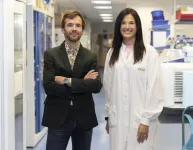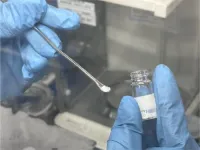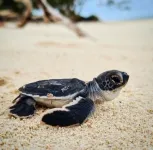(Press-News.org) SAN FRANCISCO —PLOS today announced that it has received a $1.5 million grant from the Robert Wood Johnson Foundation and a $1 million grant from the Gordon and Betty Moore Foundation to support our mission to drive Open Science forward with meaningful change in scholarly publishing. The funds enable PLOS to embark on an ambitious 18-month research and design project to explore how to tackle two barriers that exclude many researchers from meaningfully participating in Open Science: affordability and a lack of recognition for Open Science contributions in the research process. The goal of this project is to demonstrate outcomes for science that go ‘beyond the Article’ and build a business model that goes ‘beyond the Article Processing Charge (APC)’, highlighting that new solutions anchored in the principles of Open Science are feasible and can deliver tangible benefits for the entire research enterprise. PLOS seeks to be a catalyst in transforming publishing models and ensuring that science is open, recognized, and accessible to all.
“PLOS has long championed, and enabled Open Sciences contributions like Open Data, Open Code and Open Methods. Yet today’s scholarly ecosystem still places an exclusive emphasis on the article. PLOS is committed to designing a new model of research publication that enables recognition of all research outputs and contributions—creating a more comprehensive and equitable system for assessing scientific work,” said Veronique Kiermer, Chief Scientific Officer, PLOS. “The grants from the Robert Wood Johnson and the Gordon and Betty Moore Foundations will also enable PLOS to develop an equitable, non ‘APC’ business model for these new publishing capabilities, designed to foster a more inclusive, transparent, and collaborative system, while upholding the core principles of Open Science.”
“Open Science means research that’s more inclusive, equitable, and accessible,” said Nancy Barrand, Senior Advisor for Program Development, Robert Wood Johnson Foundation. “We’re excited to support this effort by PLOS to push the field in that direction by redesigning the publishing model for scientific papers to increase visibility, drive collaboration, and ultimately build a new system that’s more inclusive and participatory for early career researchers and diverse voices.”
“Since our original grant in 2002 to support the transition from pay-for-access research publication system to an open-access system, we have observed the transformation of PLOS as a publisher,” said Adam Jones, Ph.D., Science Program Officer, Gordon and Betty Moore Foundation. “With this latest grant and partnership with the Robert Wood Johnson Foundation we are excited to see an economic shift to a new approach that facilitates both access to knowledge and participation in knowledge creation by a wider range of researchers.”
The project will have three interconnected streams, which include:
Knowledge stack design
PLOS will develop a new, integrated solution that enhances the visibility and discoverability of non-article research outputs, including data, code, and methods. The goal is to ensure that these contributions are recognized alongside traditional articles without disrupting the current publishing workflow. By working with repositories and indexing services PLOS will ensure that these outputs are hosted in the best possible venues, making them easily accessible and reusable.
Upon completion, PLOS will have a fully tested, scalable solution design that can integrate with the existing digital infrastructure and publishing processes, helping researchers showcase their complete body of work.
Business models
PLOS will conduct a comprehensive economic analysis to explore how transitioning to a knowledge stack impacts funding flows across different global markets. Grounded in equity and price transparency, the goal is to develop a sustainable, non-APC business model for all research outputs in collaboration with funders, libraries, and scientific institutions.
This business model aims to be a catalyst for a global shift away from APCs, enabling greater participation in Open Science and paving the way toward long-term sustainability.
Building solutions with our communities
Driving meaningful change in Open Science requires collaboration across the research ecosystem. PLOS is committed to working closely with a diverse array of stakeholders—researchers, funders, institutional leaders, and librarians—to ensure that their needs and voices are central to the development and implementation of this initiative.
By engaging directly with communities, PLOS will ensure that the solutions that are built are inclusive, effective, and widely adopted.
More information can be found here
#####
About the Public Library of Science
PLOS is a nonprofit, open access publisher empowering researchers to accelerate progress in science and medicine by leading a transformation in research communication. Since our founding in 2001, PLOS journals have helped break boundaries in research communication to provide more opportunities, choice, and context for researchers and readers. For more information, visit http://www.plos.org.
CONTACTS:
David Knutson
Head of Communications
PLOS
+1 651-260-8288
dknutson@plos.org
END
Redefining Publishing: PLOS receives multi-million-dollar grant funding for new research initiative
2024-10-02
ELSE PRESS RELEASES FROM THIS DATE:
Planning a drug’s route in the body with synthetic chemistry
2024-10-02
Researchers at the RIKEN Cluster for Pioneering Research (CPR) have developed technology that can alter, within the body, the recognized identity of proteins. The innovation, published in Nature Communications on October 2, allowed researchers to target mouse tumors with a protein and then transport that protein out of the body. This means that cancer-killing drugs could be sent directly to tumors and then excreted from the body after dropping off their payload. The technology also has the potential to allow multi-purpose drugs that can travel from organ to organ, performing ...
Smoke from megafires puts orchard trees at risk
2024-10-02
Smoke From Megafires Puts Orchard Trees at Risk
Effects Last Months, Reducing Nut Crop Yields
By Amy Quinton | October 2, 2023
Long-term smoke exposure from massive wildfires lowers the energy reserves of orchard trees and can cut their nut production by half, researchers at the University of California, Davis, found. The smoke can affect trees for months after a megafire, depressing their bloom and the next season’s harvest. This finding reveals a new danger from wildfires that could affect plant health in both agricultural and natural environments.
Nature Plants published ...
Health Data Research UK and National Research Foundation Singapore formalize landmark partnership in health data science
2024-10-02
Health Data Research UK (HDR UK) and the National Research Foundation Singapore (NRF) are pleased to have signed a Memorandum of Understanding (MoU) today, that formalises a collaborative partnership in healthcare and data science. The partnership will leverage cutting-edge data science and research, with a focus on trustworthy data use to power improvements in healthcare, research and innovation, strengthening existing links between the UK and Singapore.
The MoU was signed by Permanent Secretary for National Research and ...
CNIO researchers propose a new treatment for brain metastasis based on immunotherapy
2024-10-02
CNIO researchers have discovered that cancer perverts certain brain cells, the astrocytes, and causes them to produce a protein that works in favour of the tumour.
A drug, silibinin, inhibits this protein, and could be used to help treat brain metastasis with immunotherapy. A clinical trial is underway.
The work is published in the American Association for Cancer Research's journal Cancer Discovery.
Researchers at the Spanish National Cancer Research Centre (CNIO) propose a new treatment for brain metastases that respond poorly, or not at all, to immunotherapy, and provide a biomarker to predict ...
Discovery of promising electrolyte for all-solid-state batteries
2024-10-02
Often overlooked, rechargeable batteries play an important part in contemporary life, powering small devices like smartphones to larger ones like electric vehicles. The keys to creating sustainable rechargeable batteries include having them hold their charge longer, giving them a longer life with more charging cycles, and making them safer. Which is why there is so much promise in all-solid-state batteries.
The problem so far is discovering which solid electrolytes offer such potential advantages.
In a step toward that goal, an Osaka Metropolitan University research group led by Assistant Professor Kota Motohashi, Associate Professor Atsushi Sakuda, ...
One-minute phone breaks could help keep students more focused in class and better in tests
2024-10-02
Phones can be useful tools in classrooms to remind students of deadlines or encourage more exchange between students and teachers. At the same time, they can be distracting: Students report using their phones for non-academic purposes as often as 10 times a day. Thus, in many classrooms, phones are not allowed.
Now, researchers in the US have investigated if letting students use their phones for very brief amounts of time – dubbed phone or technology breaks – can enhance classroom performance and reduce phone use.
“We show that technology breaks may be helpful for reducing cell phone use in the college classroom,” said Prof Ryan Redner, a ...
New study identifies gaps in menopause care in primary care settings
2024-10-02
CLEVELAND, Ohio (Oct 2, 2024)—Timely identification and treatment of bothersome hot flashes have the potential to improve the lives of many women and save employers countless days of related absenteeism and lost work productivity. Yet, a new study finds that such symptoms are often not documented in electronic health records (EHRs) or not adequately addressed during primary care visits. The study is published online today in Menopause, the journal of The Menopause Society.
Approximately 75% of women experience hot flashes as they go through the menopause transition. Despite the common occurrence of these bothersome ...
Do coyotes have puppy dog eyes? New study reveals wild canines share dog's famous expression
2024-10-02
New research from Baylor University reveals that coyotes, like domestic dogs, have the ability to produce the famous "puppy dog eyes" expression. The study – "Coyotes can do 'puppy dog eyes' too: Comparing interspecific variation in Canis facial expression muscles," published in the Royal Society Open Science – challenges the hypothesis that this facial feature evolved exclusively in dogs as a result of domestication.
The research team, led by Patrick Cunningham, a Ph.D. research student in the Department ...
Scientists use tiny ‘backpacks’ on turtle hatchlings to observe their movements
2024-10-02
New research suggests that green turtle hatchlings ‘swim' to the surface of the sand, rather than ‘dig’, in the period between hatching and emergence. The findings have important implications for conserving a declining turtle population globally.
Published today in Proceedings B, scientists from UNSW’s School of Biological, Earth and Environmental Sciences, used a small device, known as an accelerometer, to uncover novel findings into the behaviours of hatchlings as they emerge from their nests.
Sea turtle eggs are buried in nests 30 – 80cm deep. Once hatched, the newborn turtles make their way to the surface ...
Snakes in the city: Ten years of wildlife rescues reveal insights into human-reptile interactions
2024-10-02
A new analysis of a decade-long collection of wildlife rescue records in NSW has delivered new insights into how humans and reptiles interact in urban environments.
Researchers from Macquarie University worked with scientists from Charles Darwin University, and the NSW Department of Climate Change, Energy, the Environment and Water to analyse over 37,000 records of snake and lizard rescues in the Greater Sydney region between 2011 and 2021.
Their study, Interactions between reptiles and people: a perspective from wildlife rehabilitation records is published in the journal Royal Society Open Science on Wednesday 2 October.
Lead author Teagan Pyne, ...


